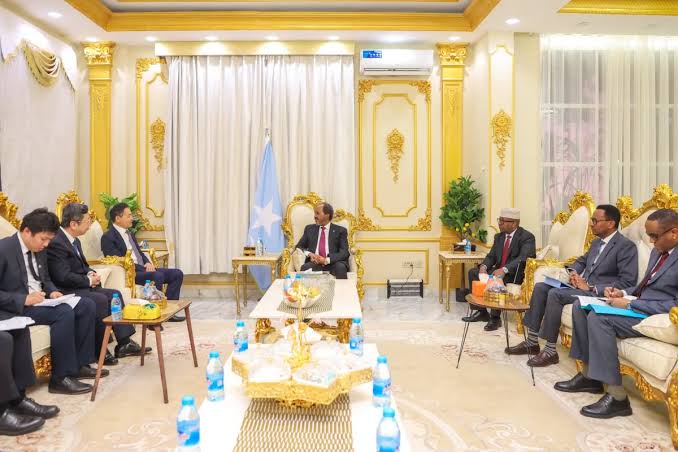Facebook Twitter (X) Instagram Somali Magazine - People's Magazine
China has reaffirmed its commitment to Somalia’s sovereignty and territorial integrity in light of escalating international discussions about the recognition of Somaliland. Xue Bing, China’s special envoy for the Horn of Africa, visited Mogadishu on Tuesday to meet Somali President Hassan Sheikh Mohamud. During the meeting, Xue expressed Beijing’s unwavering support for Somalia’s stance on Somaliland, a self-declared independent region that the international community, including China, recognizes as part of Somalia.
US Republican Advocacy for Somaliland Recognition
The visit comes as US Republican lawmakers intensify their push to recognize Somaliland, citing strategic reasons such as its location along the Gulf of Aden. Proponents argue that formal ties with Somaliland would counter China’s influence in East Africa, especially given Beijing’s substantial investments in the region. Somaliland’s strategic importance has also drawn increased attention due to its proximity to vital maritime trade routes.
However, Somalia has categorically rejected any recognition of Somaliland as an independent state, emphasizing its commitment to preserving national unity.
China’s Strategic Interests in Somalia
China’s support for Somalia aligns with its broader interests in Africa. Somalia serves as a critical partner for Beijing’s Belt and Road Initiative (BRI), which aims to develop infrastructure and enhance connectivity across continents. Maintaining a united Somalia helps safeguard China’s investments and strategic objectives in the Horn of Africa, including trade routes critical to its economic interests.
China’s engagement in the region extends beyond infrastructure development. Beijing has also provided humanitarian assistance, facilitated training programs, and strengthened diplomatic ties to solidify its influence.
Regional Implications of Somaliland Recognition
The potential recognition of Somaliland by the US could disrupt regional stability and geopolitical alliances. Neighboring countries like Ethiopia and Djibouti have expressed concerns about the implications of such a move. Analysts believe that US recognition could lead to strained relations with Mogadishu and complicate efforts to address security threats posed by groups such as al-Shabaab.
For China, maintaining strong ties with Somalia serves as a countermeasure against the perceived encroachment of Western powers in the region. By supporting Mogadishu’s stance on Somaliland, Beijing reinforces its position as a key ally to African nations advocating for territorial integrity.
China’s Broader Role in the Horn of Africa
Xue Bing’s visit is part of China’s proactive diplomatic strategy in the Horn of Africa. Since his appointment as special envoy in 2022, Xue has been mediating conflicts and fostering dialogue among nations in the region. His visit to Somalia underscores Beijing’s commitment to playing a constructive role in regional peace and development.
China’s growing presence in Africa reflects its long-term strategy to secure resources, expand markets, and bolster its global influence. As competition between global powers intensifies, China’s diplomatic efforts in Somalia highlight its intent to remain a dominant player in the region.
Conclusion
China’s reaffirmation of support for Somalia amidst US discussions on Somaliland recognition underscores the geopolitical complexities of the Horn of Africa. With both nations vying for influence, Somalia finds itself at the center of an international tug-of-war.
By aligning itself with Somalia, China not only strengthens its diplomatic ties but also counters Western influence in East Africa. As the debate over Somaliland’s recognition unfolds, the region’s stability and future alliances will remain critical to the interests of global powers.

